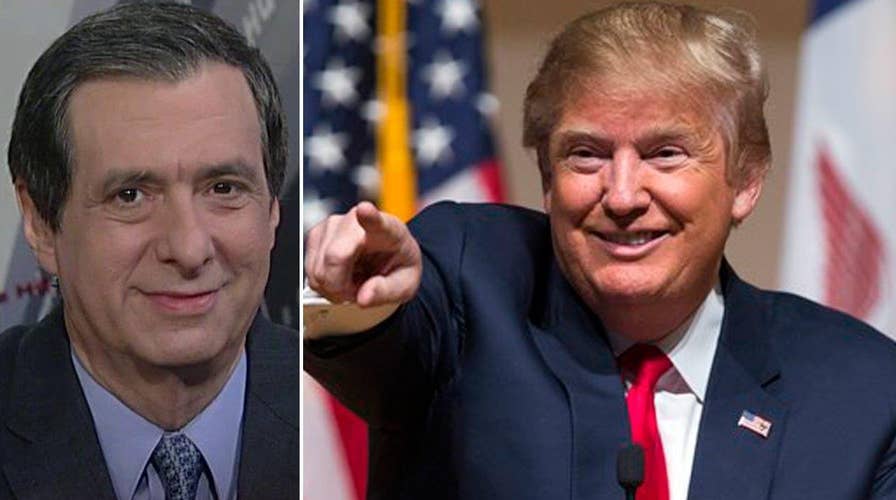Howard Kurtz on Donald Trump vs the National Review
'MediaBuzz' host discusses political civil war on the Right
Programming Alert: Howard Kurtz interviews Republican presidential candidates Donald Trump and Ted Cruz Sunday on “Media Buzz with Howard Kurtz” at 11 am and 5 pm ET on Fox News Channel.
Donald Trump, who uses the media as his personal megaphone, has spent this campaign savaging the press for treating him unfairly.
But the crux of his problem all along has been a precinct of the profession that is usually firmly entrenched in the GOP’s corner: the conservative media.
And that is why the journalistic coup attempt spearheaded by National Review is so deeply revealing, both of the nature of Trump’s candidacy and a cultural divide on the right.
Trump is not running as a true-blue conservative. That is why media reports of the liberal positions he took and Democrats he befriended in the 1990s, a recent staple of Ted Cruz’s attacks, have failed to dent his armor. He presents an amalgam of positions, from a hard-right stance on illegal immigration to a center-left view on protecting entitlement programs to a liberal appeal to tax hedge-fund guys.
Rich Lowry and the editors of National Review are right: The Donald is not their kind of candidate. He has no interest in that. He is selling an image of strength and success, packaged with plenty of bombast, that transcends the usual litmus-test politics.
When I interviewed Trump in Las Vegas for Sunday’s “Media Buzz,” I asked whether he has, through some kind of weird alchemy, become the establishment candidate, as Cruz says. Trump made no attempt to dispute it, calling the Beltway power brokers “great people” and citing Bob Dole’s criticism of the Texas senator. “I’m a dealmaker,” he said proudly.
By recruiting 22 writers to attack Trump, by calling him an “opportunist” and a “huckster” and a “menace to American conservatism,” National Review is standing up for what it believes. Trump responded in typical fashion, attacking the messenger as a faltering franchise, as he has done with Politico and other media outlets. National Review is “a failing publication that has lost its way,” he said, with its influence “at an all-time low. Sad!” And yes, Trump said the magazine’s founder, William F. Buckley, would be ashamed, despite the fact that Buckley described him in 2000 as a self-regarding demagogue.
No print publication has the influence it once had, and NR has certainly gotten a tsunami of media attention for its assault by recruiting the likes of Bill Kristol, editor of the rival Weekly Standard.
But Trump benefits from a newer and brasher wing of the conservative media, the more populist arena of Laura Ingraham, Rush Limbaugh, Mark Levin, Breitbart and others who may be more in touch with the grass roots than editors who live in Manhattan and Georgetown and attend conferences and cruises.
National Review provides the intellectual backbone of the conservative movement, but it is also part of a cultural elite that many conservatives believe has let them down. Trump, the street fighter who emerged from a tabloid culture, has no interest, and no particular need, to win over the intellectuals. He is a brawler fighting a populist campaign. They are what George Wallace, in a very different context, once referred to as pointy-heads.
For National Review and its brethren, smaller government and a muscular foreign policy are the essence of why they fight the policy wars. These positions are not what motivate Trump, who often notes that he opposed the Iraq war, championed by the neoconservatives.
This same dynamic is at the heart of his battles with Fox News, where Trump has been pounded by the likes of George Will, Steve Hayes and Charles Krauthammer, along with Jonah Goldberg and Lowry, both associated with National Review.
We saw this same disruption in 2008 when Sarah Palin, who endorsed Trump this week, became the darling of Kristol and other media conservatives. When such commentators as David Frum and Kathleen Parker broke with the orthodoxy and called Palin unqualified to be vice president, they suffered a severe backlash.
Perhaps inevitably, things get personal between journalists and commentators who find themselves on opposite sides of the same movement.
“Some conservatives have made it their business to make excuses for Trump and duly get pats on the head from him. Count us out,” National Review writes.
It may have been a misstep for the magazine to go beyond using its ideological firepower against Trump and organize what looks like a political campaign to block him from winning the nomination.
So far, at least, Trump has overpowered those who make their living with words, defying their predictions that he will inevitably implode.

